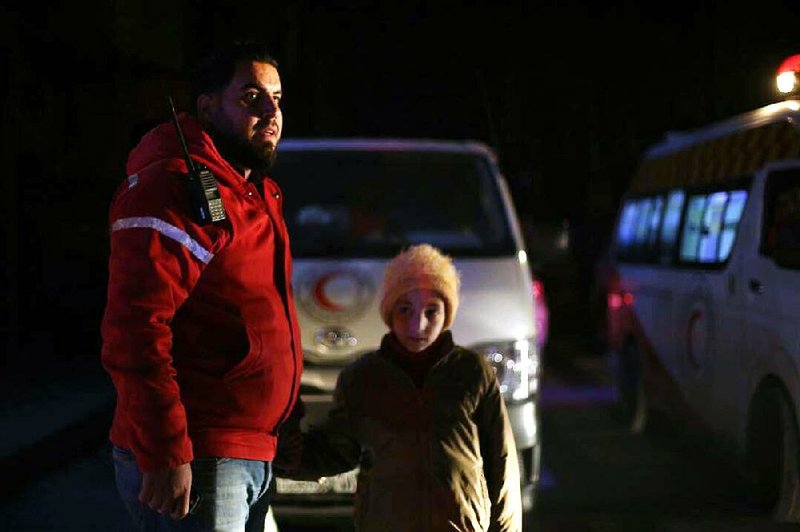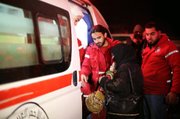ISTANBUL -- The Red Cross said Wednesday that it has begun an evacuation of critically ill civilians from a besieged suburb of the Syrian capital as part of a rare deal struck between the government and a rebel group.
Ambulances conveyed three sick children and a woman out of eastern Ghouta late Tuesday for medical treatment in Damascus hospitals. The patients, who traveled with family members, needed immediate treatment for cancer, kidney failure and hemophilia.
About 400,000 other people remain trapped in the suburb, a pocket of opposition-held territory where a long-running government blockade has caused scores of civilians to die of starvation or a lack of medical care.
Under the terms of a deal between Syrian President Bashar Assad's government and the hard-line Army of Islam rebel group, which controls eastern Ghouta, 25 more people are expected to be evacuated for lifesaving medical treatment in the coming days.
The International Committee of the Red Cross described the evacuation Wednesday as a "positive step" that it hoped would be followed by more.
But the medical mission also underscored the extent to which hundreds of thousands of civilians in Syria's remaining rebel-held enclaves rely on the deal-making of belligerents still slugging it out in the dying stages of a war that has claimed almost a half-million lives.
The evacuation is part of a wider agreement that also involved the exchange of 29 government soldiers held by the Army of Islam. At least five detainees were evacuated from eastern Ghouta late Tuesday.
Mohamed Kattoub, a spokesman for the Syrian American Medical Society, said the 29 patients prepared for evacuation were drawn from a list of more than 600 sick civilians submitted to the United Nations in October. How they had been selected remained unclear, he said.
In the intervening weeks, scores of patients have been treated in underequipped hospitals for severe malnutrition. Medical facilities in the area have repeatedly been bombed by government warplanes, according to doctors in the area.
"In the two months since we submitted the list, we have added the names of many more patients with life-threatening conditions like meningitis, or with wounds that cannot be treated in the hospitals we have left," said Hamza Hasan, a doctor in eastern Ghouta.
Rights groups say the government has used siege tactics across Syria to starve local populations and force rebels to surrender, which would amount to a war crime. The government denies the allegations, blaming the shortages on the rebel groups controlling each area.
After six years of war, Syrian government forces appear to be wrapping up their campaign, mounting offensives against opposition-held pockets in the country's north and center.
Civilians in eastern Ghouta voiced concern Wednesday that the families cleared for evacuation had been given no guarantees that they would be allowed to return to their homes or that they would not be arrested upon departure.
The U.N. has repeatedly called on the government to allow hundreds of critically ill people to leave the suburb for treatment and to expand aid groups' heavily restricted access to the area.
With food supplies running low and temperatures plunging, activists have circulated pictures of children so thin their ribs strain against their flesh. The U.N. says one in eight children in eastern Ghouta is going hungry, up from one in 50 in May.
Turkish President Recep Tayyip Erdogan said his government is working with Russia, a close ally of Assad, to try to evacuate about 500 people from eastern Ghouta, including about 170 women and children, who are in urgent need of humanitarian or medical assistance. Turkey is a leading supporter of the Syrian opposition.
A local charity worker said Wednesday that at least one of the patients on the evacuation list, a 6-month-old girl called Nada al-Taweel, had died of heart failure in the hours before the ambulances arrived.
The aid worker gave her name as Laila, asking that her family name be withheld for fear of government retribution.
Eastern Ghouta was one of the first areas to rise up against Assad when Arab Spring protests spread across the country in 2011. Government forces surrounded the area in 2013, but tunnels and smuggling allowed residents to take in food and medical supplies.
The government tightened the noose earlier this year after victories against insurgents in other parts of the country.
Assad's rule is more secure than at any time since the uprising began, and the opposition is largely confined to the suburbs around Damascus and the northwestern, rebel-held Idlib province.
"De-escalation" agreements brokered by Russia, Iran and Turkey have reduced the violence in most areas, but efforts to reach a political solution to the conflict remain stalled.
Russian Foreign Minister Sergey Lavrov said Wednesday that Russian-brokered talks scheduled for next month were crucial for reaching a settlement and would not interfere with U.N.-backed negotiations, which have made virtually no progress since they began in 2014.
Several dozen Syrian opposition groups have refused to take part in the Russian talks, accusing Moscow of failing to rein in Assad.
Lavrov, who met Wednesday with Syrian opposition leader Ahmad Jarba, told Russian news agencies that the Sochi negotiations would lay the groundwork for U.N.-led talks. Lavrov said Russia's goal is to bring together the largest number of opposition groups possible to help launch constitutional overhauls in the war-torn country.
The Syrian government, which supports the Sochi process, has vehemently rejected the opposition's central demand that Assad play no role in a political transition.
Information for this article was contributed by Zakaria Zakaria and Louisa Loveluck of The Washington Post and by Sarah El Deeb of The Associated Press.
A Section on 12/28/2017

